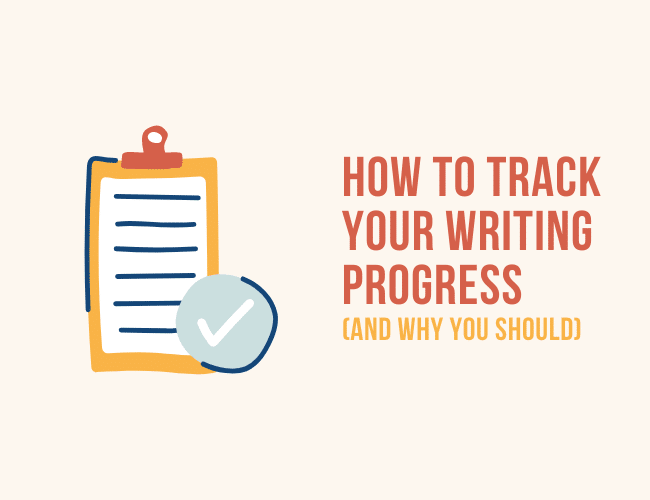How much are you writing? Every day? Every week? If you want to be a writer, you'll need to know the answers to these questions and explore a writing tracker.

I'm going to be honest. When I first started writing, I thought keeping track of my writing progress was ridiculous. How many words I wrote in a day or how frequently I wrote depended on my mood and whether that elusive muse showed up. Besides, wasting time tracking and analyzing how much I'd written during a week seemed like just another way to procrastinate and not get any writing done at all.
I don't say this often, so listen up:
I was wrong.
Writers need to track their writing progress, period. It's that simple. Read on for why and how to get tracking today.
3 Reasons Why You Should Track Your Writing Progress
Tracking your habits, exercise, food, goals, steps, and just about everything in your life has been a trend for quite a while now. You might be rolling your eyes at this article, saying “Wow, yet another thing I'm supposed to track. Give me a break!”
I hear you. Personally, keeping up with any kind of consistency in my life is rough. I recently tried a new diet (COVID fifteen, anyone?) and was tracking my food. I made it through a couple of weeks before the lack of time to cook, the availability of certain foods (COVID again), and just plain frustration got in my way. So I stopped tracking.
I really regretted it.
Still not convinced? Here's why you need to track your writing:
1. You'll lose momentum without tracking your progress.
I thought tracking my food wasn't a big deal. I thought I could just make good choices and not worry about writing every little thing down.
Yeah . . . that didn't work.
Without that written diary listing my food and exercise, I almost immediately went back to my old ways. Life happens. You forget about what you ate earlier and before you know it, you're out of willpower for the day and lying on the couch with a bag of chips. It took less than a week for me to feel terrible, both physically and mentally.
The same thing happens with my writing projects. I think I'll write at some point during the week. I think if I miss a day, I'll just make it up later with a longer writing session.
Spoiler alert: that doesn't work. I spent years trying to make that mentality into reality with no success whatsoever.
The key to writing is momentum. And the key to momentum is routine. We have a ton of posts on how to get one of those going, but my favorite is this one.
2. You (and your publisher) need to know when your next book is coming.
Answer this question: How long does it take you to write a book?
Don't know the answer? That's probably because you don't track your writing progress in any way.
Is your answer that it depends on what's going on in your life? That's not going to fly.
You actually need to know the answer to this question as a writer. Whether you self-publish or traditionally publish, you'll need to know (or your agent/publisher/editor will need to know) when you can expect that next draft, and more importantly, when you can expect that book to hit the shelves.
How are you supposed to know any of that if you don't track your writing progress?
3. How much you wrote isn't all you need to know.
If I have a low productivity week, I need to know why I wasn't productive. Just like any other job, if I'm struggling to make a goal or assignment happen, I need to fix the problem.
Was it stress? Was there something more pressing taking up my time? Was I just being lazy and not getting out of bed early enough to fit everything in my day? (By the way, getting up early is the number one recommended way to fit writing into your busy life. Just saying.)
The same goes for a productive week. Did I get enough sleep? Was the sun shining (this is a huge one for me)? Did something great happen in other areas of my life? Did I just have a lull in other responsibilities?
The “why” is just as important as the “how much.”
4 Steps to Track Your Writing Progress
Now that you're convinced you need to track your writing (you are convinced, right?), let's get down to how to track your writing progress.
1. Pick your writing tracker (just about anything will work).
A lot of writers use software to track their writing progress. Here are some common writing progress trackers you can try:
A spreadsheet. A spreadsheet will do, where you simply record the date and time of your writing session and how many words you wrote. If you don't want to make your own spreadsheet, here's one you can download. You could also use Google sheets.
Scrivener. Scrivener has a built-in counter for this, if you're into using full-blown writing software with all the bells and whistles. Scrivner allows a target manuscript word count as well as a writing session word count goal. I find the session target to be quite useful and better than Word, where you have to highlight what you've written to get session count.
StoryToolz. If you're into the idea of a visual progress bar, you could try StoryToolz for free. They have a ton of different progress trackers.
A public tracker on your author website. If you really want accountability, you could take the gutsy move of embedding a tracker on your author website. In my opinion, this is a pretty cool way to not only keep your readers in the loop on your progress, but also keep you accountable and on track. Writertopia has tools for this.
There are many more apps and programs out there, but for me, the simplicity of these doesn't quite cut it. I need a bit more. (Only a bit! This is NOT meant to be a procrastination task! Doing something writing-related does not count as actually writing.)
Planners: My favorite writing progress tracker
I love planners. LOVE THEM. I love them so much that I buy my planner for the following year before October of every year. I really want to gush more about planners and how I use them, but I'll refrain because I know y'all think I'm a nerd right now.
Anyway. Part of the reason I love planners is I love to use them as a tracker for my writing progress. It's not a boring old spreadsheet full of numbers that make your eyes swim. It's not in an app or program on my computer where I can't take a look at it from any space in my office. (I'm very much a visual person and need to see things in front of me to stay motivated.)
A planner is right there in front of me where I can flip through easily. I can fill in my goals quickly and put a little check mark if I hit them. (It's nerd fun to flip through and see all the check marks!)
Want a planner specifically designed to help you finish a book? You could try The Write Planner, our new planner from The Write Practice, that walks you through our proven process to take your idea and turn it into a finished book.
Get the planner you need to plan your writing by the day and the week, track your writing progress, and write your way to a finished book.
2. Plan for the week ahead.
This is yet another reason I prefer planners to spreadsheets or time tracker apps: I like to plan my writing sessions based on what's on the docket for the week.
For most of us, each day. brings a different set of responsibilities and appointments. I have a dentist appointment tomorrow morning during the time I normally write. My schedule has been rearranged for tomorrow only so I can still squeeze some writing in.
It's that type of thing that can keep you on track and keep you moving forward. Don't be the person who says, “Well, I didn't have time to write last week. I had a dentist appointment, you know, and it just screwed up my whole week.” Even if you don't have a daily word count goal, you can work around your schedule in ways that make sense.
3. Analyze and reflect.
I know you probably squeezed in a writing session and want to run off to the next thing. I urge you to take a moment and reflect on how the session went. What went well? What distracted you? Just a quick note will do. You don't need to write an entire diary entry (nor do I recommend it).
I'd also recommend taking time out to reflect and analyze your writing progress at the end of each week. Think about what went well and what didn't. What can you do differently next week? What are your writing goals for next week?
Plus, take a look at all you wrote that week! You rock!
4. Fix the issues. Keep what's working.
There'd be no point in the analysis if you weren't going to fix the problems. If you normally write at night, but you're having trouble staying awake, then you've got to move your writing time. If you think you can get it done during your lunch break, but your coworkers keep trying to talk to you, then that's not going to work.
If you killed it on the word count one week, figure out why and make sure you try to keep that going. Got enough sleep? Good. Get the same amount next week. Spouse took the kids outside for half an hour to give you some quiet time? Bless them and ask them to keep it up.
Remember the entire point of tracking is to see what's working, troubleshoot what's not, and give you an estimate of your productivity level. It's not just for funsies. Use the info you track to fine-tune your writing routine.
What Works For You?
What this entire post boils down to is this: track your writing progress so you can find what works for you.
A planner, a tracker app, or writing on your wall. Morning, noon, midnight. Music blaring at a café or dead silence in the middle of the woods. No matter how or where you write or how you track your progress, it's all about figuring out what works best for you and your process.
So pick a way to track and get to experimenting!
Do you track your writing progress? How? Let me know in the comments!
PRACTICE
Set a timer for fifteen minutes and plan out next week's writing. Set your writing schedule and your goals.
When you’re done, share your plan in the Pro Practice Workshop. Let's give each other some encouragement! Bonus if you come back in a week and give us your weekly writing reflection!
Sarah Gribble is the author of dozens of short stories that explore uncomfortable situations, basic fears, and the general awe and fascination of the unknown. She just released Surviving Death, her first novel, and is currently working on her next book.
Follow her on Instagram or join her email list for free scares.





0 Comments